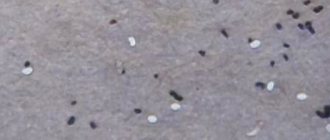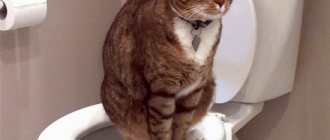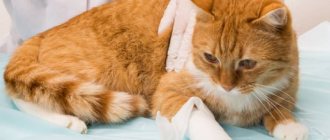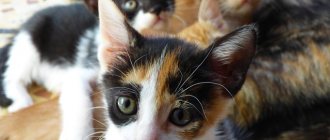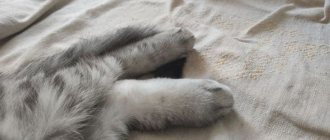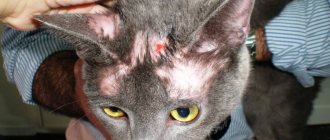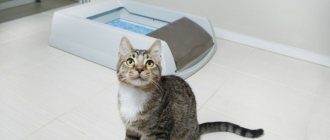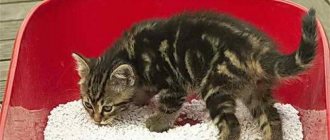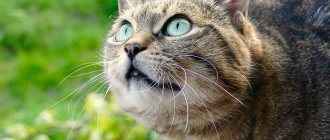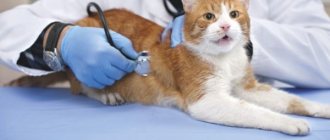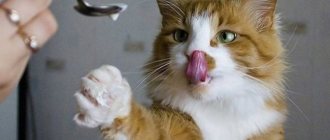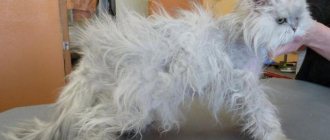If your furry pet has no health problems, his stool does not contain any additional inclusions. In appearance it is dense and formed. Mucus found in a cat's feces, blood discharge or diarrhea signal to the owner that problems have arisen in the animal's body, often of a serious nature. After independently studying the symptoms, it is recommended to seek help from a veterinary clinic or hospital, take the prescribed tests, and then the doctor will be able to prescribe effective treatment for the disease.
The main causes of mucus
It's hard not to notice the deviation. Mucus in appearance resembles translucent or white viscous substances in feces. There may be a small amount of them, but it also happens that the discharge completely covers the cat feces. In each case, this is a signal to quickly contact a specialist, since pathological changes occur in the cat’s body. The appearance of mucus is caused by the following reasons:
- the appearance of worms;
- bacterial infections and diseases;
- binge eating;
- functional failure of the digestive system;
- fatty diet;
- stressful situations;
- allergic reactions of the body;
- wool in the gastrointestinal tract;
- reaction to medications;
- weakened immunity;
- a sharp change in the food menu;
- intoxication;
- clogged intestines.
A fatty diet in an animal can lead to such a disturbance in the appearance of feces.
All these various reasons contribute to a malfunction of the body, thereby causing mucus and scarlet blood in the cat’s stool.
A person cannot influence their occurrence and it is almost impossible to independently determine why a kitten has foreign discharge and transparent ichor in its stool. However, with such impurities and additional symptoms, it is clearly noticeable that the animal is sick.
What causes blood or mucus in my cat's stool?
There can be many reasons for blood or mucus in your cat's stool. Some common reasons include:
- Dietary changes and food intolerances;
- Inflammatory bowel diseases (IBD);
- Intestinal parasites such as Giardia;
- Infections;
- Trauma or abscess;
- Rectal polyps or tumors;
- anal gland abscess or infection;
- Constipation or idiopathic feline megacolon;
- Poisons or toxins;
- Cancer.
How to recognize?
The manifestation of the following symptoms indicates the following diseases:
- If a cat poops mucus, this is a consequence of exceeding the dose of vitamins.
- Bloating and loose stools in your pet indicate intolerance to certain foods in the diet.
- Lumps of mucus in diarrhea, vomiting, and weight loss indicate inflammatory processes in the gastrointestinal tract.
- Loose stools with white inclusions, weakness, lethargy, nausea, discharge from the eyeballs and nose indicate that a viral infection is spreading throughout the body.
- Modified feces with mucus, restlessness of the pet, pain in the abdominal area are considered the main symptoms of colitis or enteritis.
- Feces acquire a pungent, stinking odor, and there is mucus and blood present—signaling inflammation or oncology.
- Liquid stool consistency with dark streaks, vomiting, and rapid loss of body weight indicate the presence of worms in the body.
- If the feces have acquired green or yellow shades, increased appetite, flatulence, bloating - reasons to check the condition of the cat's pancreas.
Only if your pet takes antihelminthic medications can you not worry about mucus in the stool. This sign is not considered a pathology and may persist for the first few days after the procedure. The cat goes to the toilet this way simply because its body is cleaning itself.
Mucus with blood and other pathologies
Nausea in a cat indicates the presence of an infection.
Small bloody spots with mucus accompanied by nausea and vomiting, loss of appetite, and intense weight loss indicate the presence of a viral or bacterial infection.
- Liquid stools that are green or deep yellow in color and greasy in nature are a sign of pancreatic disease. Associated symptoms are periodic release of gases, nausea, vomiting, increased appetite during exhaustion.
- A sharp, unpleasant odor of liquid, mucous stool indicates the possible growth of a cancerous tumor or severe intestinal inflammation.
- Excessively light, almost colorless stool may be present in diseases of the liver and biliary tract.
- Digestive dysfunction manifests itself in the occurrence of grayish diarrhea with a strong putrefactive odor.
- Feces of a watery consistency will be released when the absorption function in the intestines fails.
If there are no accompanying symptoms, this is almost always a sign of overfeeding.
Help methods
The appearance of the first signs requires restricting the pet’s food for a period of 24 hours.
Water for the cat should be freely available.
- Water must be freely available, and hunger must be fully tolerated.
- At the same time, if the animal has no desire to drink, it must be force-fed, often and in small portions to avoid dehydration.
- If the cause is ordinary overeating or mild poisoning, the use of activated carbon will be acceptable help. Half the tablet should be dissolved in water and given to the patient every six hours.
- It is recommended to prescribe smecta and use it in children's doses.
- A good remedy would be oak bark in the form of a decoction as an astringent. As a rule, after the first necessary help, diarrhea stops.
- If this does not happen, you should immediately consult a doctor to establish a complete clinical picture and make an accurate diagnosis.
When should you see a doctor?
If an animal with such a symptom begins to look sick, then it needs a visit to the doctor.
Important symptoms are also vomiting, blood streaks in the stool, frequent diarrhea, frequent urination, increased thirst, increased body temperature, unhealthy appearance, complete or partial refusal to eat. It is recommended to monitor the cat's condition for the first few days. If the situation does not change and all the symptoms persist or develop with renewed vigor, then you must definitely contact your attending veterinarian in order to get tested and prescribe the appropriate treatment for your furry pet.
What will the veterinarian do to determine the cause?
Most of these problems can be diagnosed based on the animal's medical history, physical examination, and microscopic examination of the animal's stool. Your veterinarian will look for blood, parasites, bacteria, and other possible causes of blood and/or mucus. In more serious cases, X-rays, ultrasound, blood and urine tests will be performed. Treatment will be based on an accurate diagnosis.
If you notice anything strange in your cat's feces, don't hesitate; Contact us for veterinary help. We've seen too many cats for whom it was too late to get help, simply because their owners hoped to solve the poop problem on their own. And our best advice is to continue to monitor your cat litter carefully.
If you are unsure, consult with our veterinarian—they will be your best resource in determining which toys and objects are safe for your cat, and can also give you tips on how to prevent your cat from eating strange objects.
Basic tests as a diagnostic method
In order to diagnose the disease, the veterinarian may be interested in:
- The cat's attempts to rub its butt on the carpets. This behavior indicates an existing problem with the anal sinuses.
- Injuries, blows, bites in this area. May cause great discomfort for the animal.
- Detailed description of your pet's diet.
- Swallowed objects, ingestion of spoiled food.
If the doctor needs to clarify something, the animal may be sent for an x-ray.
Upon receipt of all the answers of interest, the veterinarian immediately makes a diagnosis or prescribes additional procedures. So, he can send the cat for feces, urine, blood, and examination of the rectum by swallowing a probe under anesthesia. By analyzing the profile of chemical elements in the bloodstream, it is possible to understand what is happening in the body. Colonoscopy and x-rays of organs are performed as prescribed by the doctor. As a result of receiving answers, effective and efficient treatment of the disease is selected.
How to help an animal at home?
Rice water can help with diarrhea
Not in every case you can help your pet yourself. Delay is dangerous, and it is better to start taking action with your pet’s first loose stool. If the diarrhea is not frequent, is of normal color and has a normal smell, then a special diet or fasting and drinking plenty of fluids will help. In this case, a decoction of rice or oak bark can also help.
If the hunger strike was not possible within 24 hours, the cat’s condition worsens and the pet regularly passes loose stools, then it is necessary to contact the appropriate specialist. Don’t think twice about how to help the animal; any delay can cause serious harm to your pet’s health.
You should not give your cat human remedies for diarrhea, especially if it contains mucus! Many of these drugs are toxic and can worsen the situation in the animal.
Treatment of the disease
There can be no self-medication when such symptoms are detected. After testing, medications and preventive measures are prescribed to cure the disease. On the first day, it is recommended to unload the body from food; only water is allowed. Further, the following drugs are used for each ailment separately:
- Viral infections. Treat with subcutaneous injection of antiviral serum.
- Bacterial diseases. Only antibiotic therapy will help.
- Poisoning and intoxication. The medication "Atoxil" is prescribed.
- Worms. Antihelminthic drugs solve this problem.
- Intestinal microflora disorders. Probiotics are needed for a course of at least 10 days.
- Spasms. Antispasmodic drugs are prescribed, especially for acute pain.
After treatment, cats easily return to normal, and the functioning of the intestines and esophagus improves. The animal goes to the toilet painlessly, for the most part, it does not secrete white mucus and there is no transparent ichor in the impurities. To summarize, we can say that blood and mucus in a cat’s stool are considered pathological secretions and signal the development of the disease. This cannot be left to chance; you must consult a specialist if additional symptoms appear.
Liver diseases
Regular digestive disorders in your cat are a good reason to immediately contact a veterinarian. It is possible that he has some kind of liver problem. The latter, as is known, is the largest endocrine gland. In particular, it produces bile, which is vital for the digestion and absorption of fats. If the organ is not healthy, your pet may have yellow, mucus-filled diarrhea . Mucus in this case is the result of corrosion of the mucous membranes of the intestines by bile. This can happen when the bile ducts are blocked (parasites, tumors), and only occasionally the bile “breaks through” out.
And this is fraught not only with diarrhea, but even with death as a result of cholemia .
Additionally, liver problems are indicated by poor condition of the cat’s skin and coat. They become hard and inelastic, and in the most severe cases an unpleasant, musty odor emanates from the animal. Urgent treatment is required.
Causes of diarrhea in cats
Diarrhea with red mucus
There can be many reasons for loose stools, however, the most common are:
- Change of food. It often happens that a cat needs time to adapt to new food, supplements or vitamins.
- Digestive disorders. It happens that owners give their pet expired food or sausage skins. Such food is poorly digested, which can cause problems in the animal’s intestines.
- Poisoning. Cats by nature are very picky about food, so none of them will eat inedible products, such as household or chemical products. But, your pet can easily inhale fumes from paint, gas and other toxic drugs. If any chemicals get on the animal’s fur, the cat will instinctively lick itself, thus poisoning will occur.
- Stress. Cats, just like humans, experience various stresses. They may be associated with moving or the arrival of a new pet in the house. Often, there is loose stool after childbirth, and it is associated with experienced emotional stress.
- Vaccinations and various medical procedures. Diarrhea in an animal can occur as a result of vaccination. Not every vaccination is suitable for the pet’s body, which will result in loose stools. This also happens during castration and sterilization. After such procedures, the cat may lose appetite or experience diarrhea due to insufficient metabolism.
Causes of diarrhea with mucus
Cat feces with traces of mucus
There are several factors that cause loose stools with mucus:
- Often mucus appears due to the presence of parasites in the intestines. Cats with poor digestion develop parasites - helminths, and protozoa - Giardia or trichomoniasis.
- After anthelmintic drugs, in the first 2-3 days, diarrhea with mucus may occur. This is quite normal. The cat will feel good. Mucus indicates that there were a lot of worms in the body, but after taking medications, they come out. The mucus will disappear in about two days. After this, it is necessary to carry out anthelmintic treatment for the owner, because worms from the cat are transmitted to humans.
Fever and diarrhea
If, in addition to diarrhea with mucus, the cat has symptoms such as fever, weakness and loss of appetite, this indicates inflammation in the intestines. In this case, you need to take a stool sample and go to the veterinarian. Under no circumstances should you delay with such symptoms!
Preventive measures
To ensure that the disease no longer bothers your pet, it is necessary to identify the original source of the problem and try to eliminate it. Often inflammation of the paraanal glands occurs due to improperly selected cat nutrition. In such a situation, it is better to contact a veterinarian who will help you create a balanced diet rich in essential vitamins, nutrients and other vital elements.
In addition, it is important to monitor the body weight of your four-legged friend and encourage him to spend time actively. You should not skip scheduled preventative visits to the doctor, during which you should describe in detail how your pet is behaving and whether it has any suspicious discharge. If relapses occur frequently in cats, to prevent complications, the veterinarian will advise removing the paraanal glands, which will save the pet from suffering.
